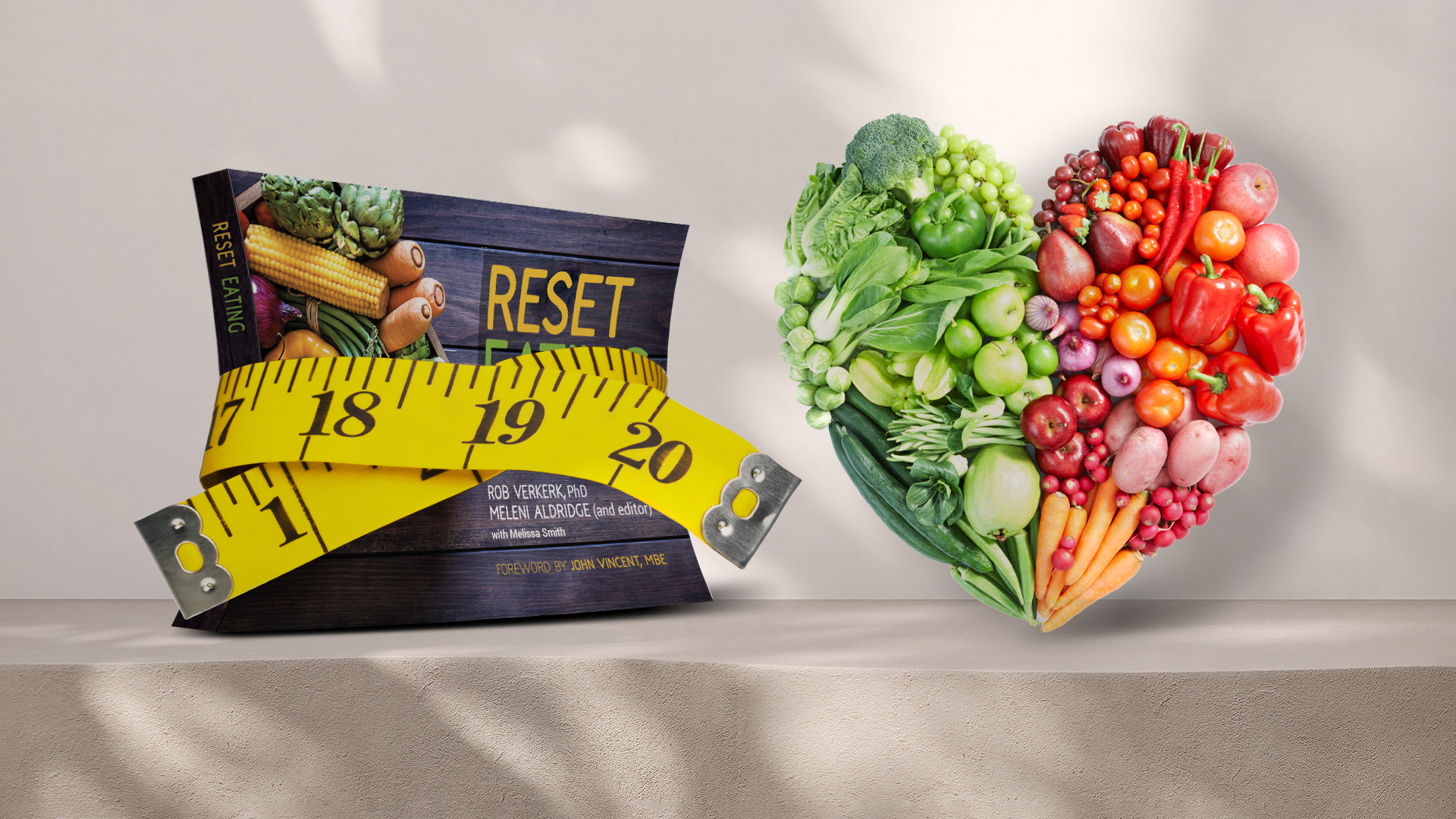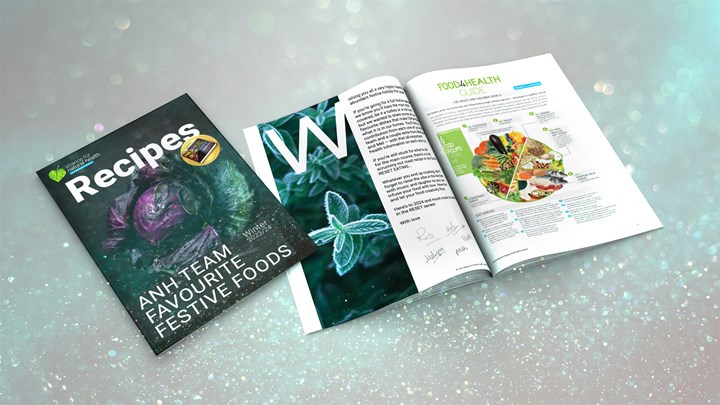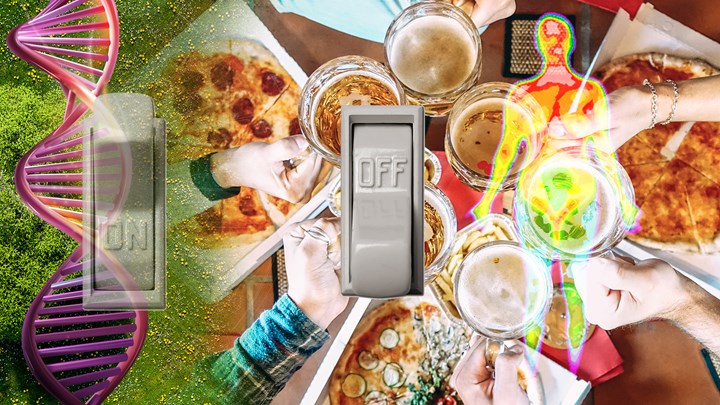Content Sections
By Meleni Aldridge, executive coordinator and Melissa Smith, outreach & communications officer, ANH-Intl
Welcome to January. A month synonymous with change. It’s a new year, a perfect opportunity for a fresh start, to set clearer goals and firm up resolutions where things that you know need addressing, things that you might have put off and put off, but feel now like they shouldn’t be put off any longer. For those surveyed by Forbes last year about their New Year goals, almost half the respondents in the UK and in the US identified that being more active and exercising more was top of the list for 2024, with weight loss a very close second. Although “drinking less alcohol” features too (‘Dry January’ is big in the UK), it’s particularly noteworthy that it’s topped by improving diet and reducing stress, with finances and relationships being noted specifically as impediments to wellbeing.
The last 4 years have certainly taken their toll on health and wellbeing which is evidenced by the increase in consumption of alcohol during lockdown, the processed and ultra-processed (comfort) foods epidemic, the desire for quick fixes like medical tourism (particularly for weight loss and wellness) and rates of drug prescriptions for antidepressants.
But is a quick fix really the best decision for one’s health and to secure effective change for the long term? My (Meleni) personal health journey coming back from autoimmune thyroid disease and a total thyroidectomy extended over more than two arduous decades, involving quite some time spent morbidly obese (yes, I was 230 lb, or over 16 stone or 105 kg in other currencies, at my heaviest) so I know a thing or two about being desperate for a quick fix. I think I’ve tried most things — except bariatric surgery, which was never for me — and nothing I tried worked as quickly (for me, 3 months), or as permanently (now 13 years stable) as the protocol we outline in our book, RESET EATING. I've never looked back, but more importantly it's been an important and empowering partnership journey with my body.
Fatphobia or genetic imperative?
With the extreme sensitivity around ‘fatphobia’ being at an all-time high, it’s important to make a differentiation between recognising and naming the very natural drive to seek health and vitality and the kind of unkind disregard that people of fuller body can experience. Just like we have it hardwired into our genetic blueprint to seek out and consume high calorific foods to see us through the lean times long, long, ago, most of us also have a genetic imperative linked to the survival of the species to be healthy and vital and to choose a healthy and vital mate to procreate with. It’s written into our genetic code, within the vast majority of human beings, even if buried deep, which is why, despite the moves to normalise being overweight, so many seek a fat fix. The flourishing weight loss industry is testament to this, even as the fat positive movement takes things to whole new levels. This is crystallised by Kate Manne in the introduction to her new book, Unshrinking, where she writes, “It is nothing less than to remake the world to properly fit fat bodies, and to effect the socially transformative recognition that there is truly nothing wrong with us”.
The fat acceptance movement, which has existed since the 1960s, aims to get rid of discrimination based on body size, while the body positive movement encourages people to feel comfortable with their body, whatever its size. Completely on board, but in their extremes, such initiatives are widely considered to be contributing to the ongoing normalisation of obesity, which is, in itself, emerging as a driver of the obesity crisis.
This article isn’t intended to fat shame, or cause hurt to people with fuller bodies, or make thinner people who dislike their bodies feel worse. It’s about sharing the good news that there is a way to work with our genetic blueprint and our evolutionary heritage that is positively beneficial for your body, your mind and your health. Benefits that permeate every aspect of our wellbeing. More than that, it makes sense to our physiology so it’s easier for the body to respond. We're also concerned, that there is a risk that talking openly about weight loss is at risk of becoming a taboo that will be increasingly targeted by social media censors.
As someone (Meleni) who’s experienced the dramatic transition from being normal weight, to morbidly obese and back to normal weight again, I can speak from experience, painful experience. As a nutrition and clinical psychoneuroimmunology (CPNI) health practitioner, I understand the risks of carrying additional pounds, but I also know what it’s like to be physically, and physiologically, hampered by my size. It’s not about getting 'celebrity thin', as each one of us is individual and we have a normal weight that works best for us. Weight loss is largely the side-effect of correcting a dysfunctional metabolism and restoring metabolic resilience and flexibility. Given the market share of the weight loss industry and the growth of medical weight loss tourism, there are clearly many others who are seeking their normal weight rather than having the world accommodate them as they are. I just wish this information was incorporated into mainstream dietetics so that it could be broadcast via public health messaging. It took me 25 years to find what worked and when I did, it was so simple, so fast and it's become a permanent life change.
Quickly fixed or primed for dysfunction?
For those desperate to find a quick fix and unable to access weight loss treatments either due to lack of eligibility, waiting lists or costs through local medical systems, it’s become increasingly common for people (in the UK, often young women), to travel abroad for treatment to countries such as Turkey, Mexico, Pakistan and Lithuania amongst others, for cheap weight loss surgery.
Nicky (not her real name for reasons of anonymity) is a twenty-something case in point, and someone known to us. She felt she didn’t ‘have the headspace’ to lose weight by changing what and how she ate, so like many other young women in their early 20s in her peer community, she opted for bariatric surgery thinking it would be the magic bullet. However, in order to qualify for the surgery, she was told she needed to be around 5 stone / 70 lb / 32 kg heavier. Undeterred and without any additional nutrition advice or counselling, Nicky spent the next 8 months dutifully gaining sufficient weight to qualify for the gastrectomy she has now had in Turkey. Thankfully, Nicky’s operation was ‘successful’ with no serious side-effects, apart from the inability she has now to eat more than a few small mouthfuls at a time, with potato crisps and low-fat protein shakes being the easiest to digest. Many others have not been so lucky (here and here)
Surgery and drugs: magic weight loss bullets?
Three quarters of adults aged 45 to 74 years in the UK are now classed as either obese or overweight. In the USA, 42% of adults are obese, while in Mexico 74% of the entire population is considered to be overweight or obese.
It's understandable why bariatric surgery is so much on the up. It’s become ever more accessible and affordable, doesn't involve much effort or personal change or encroach on already overwhelmed head spaces. Interventions range from a gastric band to a gastrectomy (also called a gastric sleeve), where up to 70% of your stomach is removed, thus reducing the size of your stomach, creating a narrow 'sleeve', and in turn, the amount you can physically eat. The knock-on effect of both procedures is a heightened risk of developing significant nutrient deficiencies which in turn are likely to have long-term effects on health. In the case of a gastric sleeve, they remove the part of your stomach that secretes ghrelin, the hormone that makes you feel hungry, but a key hormone in the feedback loop with leptin and adiponectin, all three of which being key components of healthy metabolic function.
During the gastric sleeve surgery, gastric branches of the vagus nerve are cut affecting the essential, and still so misunderstood, gut-brain connection, with, potentially, further ramifications for vagal function and tone. There is also no guarantee you’ll lose the amount of weight desired, plus you can still regain weight (here and here).
It's not just adults who are attracted to weight loss surgery. As more and more children struggle with their weight, they too are undergoing surgery. In the US there’s been a near 20% increase in bariatric surgeries in young people, which is, disturbingly, in our view, being actively promoted by the American Academy of Pediatrics.
Far from a quick fix, longer-term complications also include gastrointestinal obstruction, hernias, gastroesophageal reflux, hypoglycemia, malnutrition and vomiting. Obesity is a complex and multifaceted condition, which surgery alone cannot hope to address and doesn’t purport to. But leaving a multitude of underlying issues unaddressed, dysregulated eating, childhood trauma or food addiction for example, is a disservice to the patient as it leaves the door wide open to regaining the weight and continuing bad food habits, as well as poor mental and emotional health.
Despite all this, the market for bariatric surgery is estimated to grow by nearly 6% in the next 6 years. The fastest growing market is Southeast Asia, but the largest by far is still America.
And now we have a whole new generation of weight loss drugs...
Weight loss drugs like semaglutide injections, Ozempic, WeGovy and Mounjaro. Far from being magic bullets, the injections come with a range of, often debilitating, side effects’ including diarrhoea, constipation, nausea, vomiting and more seriously, thyroid cancer and blocked intestines.
>>> In March 2023, we covered Novo Nordisk’s new weight loss drug: Are you up for taking Big Pharma's new 'skinny' jab?
Nature’s (relatively quick) fix
From an evolutionary perspective we’re hardwired to store fat to protect us during times when food is scarce, such as during winter and in famines. Our ability as humans to store fat is a survival tactic, so for those of us who are a little more adept at it than we’d like, think of it like a gift written into your genetic blueprint. You are built to survive! Adipose (fat) tissue is also necessary to provide energy for growth, reproduction and immune function, as well as secreting and receiving diverse signalling molecules making it one of our body's counterbalancing risk management strategies. Let alone ensuring that the next generation can be successfully nurtured, thus guaranteeing the survival of the species.
As food supplies became more stable, even plentiful as we adopted agriculture, this particular genetic adaptation became more problematic for some. In modern day, the introduction of highly processed food products designed to bypass our normal metabolic systems, mean we eat even when we’re not hungry and keep eating as the foods are engineered to hit a particular bliss point that triggers food addiction.
The hormonal and metabolic dysregulation arising from the misalignment between our genes and the lives we now lead, combined with more sedentary lifestyles and food that our bodies don’t recognise, is at the heart of what ails us. Overweight and obesity being the visual red flags. When it comes to food, we ignore our genes and evolutionary history at our peril. As well as being a carrier for energy, food is a profound source of biochemical information that needs to communicate in a language that our genes recognise and can interpret.
Food literally changes the way our genes express. It’s why it was our first medicine — and still is. Making the right food choices to inform healthful gene expression puts us on track very quickly to a new world of health and healing with metabolic flexibility at its core. It's hard for dysfunction and disease to flourish in a resilient, vital body that adapts to change easily. A metabolically resilient body is usually one that’s at its ‘fighting’ weight, flexible, vibrant and vital, naturally. It's why we're still here as a species and it's how we find the road back to health again.
>>> Buy your copy of RESET EATING and learn to speak to your genes with food in a language they understand.
>>> If you’re not already signed up for the ANH International weekly newsletter, sign up for free now using the SUBSCRIBE button at the top of our website – or better still – become a Pathfinder member and join the ANH-Intl tribe to enjoy benefits unique to our members.
>> Feel free to republish - just follow our Alliance for Natural Health International Re-publishing Guidelines
>>> Return to ANH International homepage








Comments
your voice counts
13 January 2024 at 11:09 am
Thanks for another relevant and timely article guys.
Weight loss can be complex which many people find it hard to do sustainably without rebounding.
I have been working with groups and individuals for a few years now from the pharmacy - mostly with type 2 diabetes - who get good results with both weight reduction & HbA1c (average blood glucose over 12 weeks) by reducing carbs & sugar and understanding which fats are beneficial and detrimental.
I have just completed a CNM Health Coach Diploma to bring this to another level. Health coaching individualises the process, helping the person:
* Understand why they are where they are
* Decide where they want to be
* Formulate an action plan to get there
* Review and adapt their action plan as necessary
Tracking changes in HbA1c and body composition analysis (Lean mass, fat mass and hydration) are very motivational.
15 January 2024 at 1:27 pm
Fantastic article Melanie and Melissa. I had no idea that so much damage was find with bariatric surgery. My brother's partner died 3 months after having this when her surgery went very wrong. It was a very unpleasant demise.
Your voice counts
We welcome your comments and are very interested in your point of view, but we ask that you keep them relevant to the article, that they be civil and without commercial links. All comments are moderated prior to being published. We reserve the right to edit or not publish comments that we consider abusive or offensive.
There is extra content here from a third party provider. You will be unable to see this content unless you agree to allow Content Cookies. Cookie Preferences